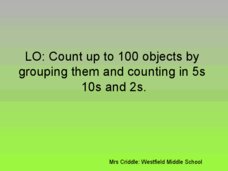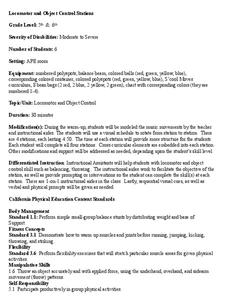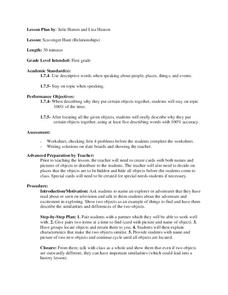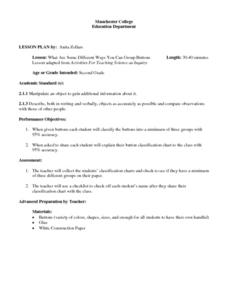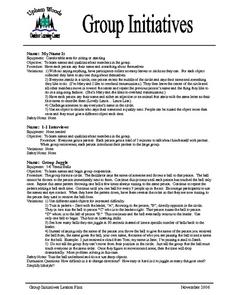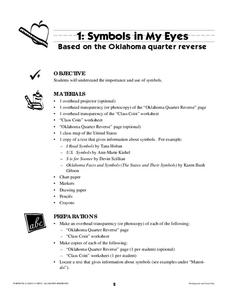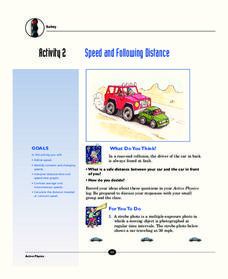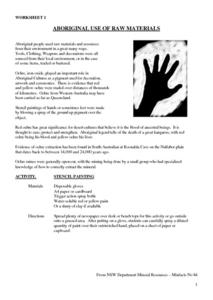Curated OER
Counting by Grouping Objects
Kids can count to 100 by 2's, 5's, and 10's, it's called counting by grouping. They are presented with a variety of counting tasks, they count each set of objects by 10's, 2's and 5's then discuss which method was quickest. A challenge...
Illustrative Mathematics
Sort and Count II
Capture the engagement of young mathematicians with this hands-on sorting activity. Given a bag of objects, young scholars work independently sorting the items based on their physical attributes, counting to determine the size of each...
Curated OER
Use Estimation to Compare Numbers
"Take a walk" with this activity and estimate how many birds, ants, turtles, flowers and children getting on a bus that you see. Based on the size of a single set of 10 objects, learners estimate how many are in the whole group. They...
Curated OER
Counting to Thirty
In this math worksheet, student practice counting up to 30 and writing the correct number. Students analyze 10 groups of objects. For each group, students count the shapes and write the number on the line.
Teaching Adapted PE
Locomotor and Object Control Stations
Develop children's basic locomotor and object control skills with an invigorating Adaptive PE instructional activity. A series of four, timed stations engaged the class in playing a game of Twister, walking on...
Curated OER
Scavenger Hunt
First graders participate in a scavenger hunt. In this grouping lesson, 1st graders search for pictures of objects around the room, then find the card with the name of that object written on it. Students also discuss the similiarities...
Curated OER
To Kill a Mockingbird - Introductory Role Play and Historical Background
High schoolers participate in role-play activities to explain that emotional and social effects of prejudice discussed in the novel, To Kill a Mockingbird.
It's About Time
Center of Mass
Lead your class on an exploration as they locate the center of mass in several oddly shaped two-dimensional objects they create from their imaginations. Pupils also determine the location of the center of mass in three-dimensional...
Curated OER
Counting Numbers 0-30
Counting can be fun and it is always a good idea to begin counting practice with concrete objects. Kindergartners hear the story "Five Little Monkeys," then practice grouping, counting, and documenting (drawing) sets of five.
Curated OER
Sets Of
Represent multiplication as sets of items for beginners to this concept. They look at six familiar object sets and determine the total number of legs by counting the sets. There is some scaffolding here, as the first is done for them and...
DiscoverE
Design a Shoe
Engage young scientists in a project where high fashion meets engineering! Using foam core and hot glue, partnered pupils design and create a functional, fashionable pair of shoes. Groups then put the footwear through its paces using a...
Curated OER
What Are Some Different Ways You Can Group Buttons
Second graders classify and group buttons. They discuss how their buttons are alike and different, and identify the characteristics of their handful of buttons. Students then classify their buttons into three groups, and create a...
Curated OER
Group Initiatives
Students explore the names and qualities about members in the group. They each say their name and something about themselves. Students gather around in a circle. They listen to the teacher as he or she says the name of someone and throws...
US Mint
Symbols in My Eyes
Explore the hidden meanings behind the images on US currency with this elementary school lesson on symbolism. Starting with a class discussion about symbols, children go on to brainstorm different objects that represent the Unites...
Poetry Society
A Conceit Poem
Young writers needn't be self-involved to craft a conceit. Directions for how to craft this form of extended metaphor, models, and a worksheet are all included in the packet.
Science 4 Inquiry
Introducing the Types of Energy
Young scientists explore many different types of energy including light, heat, nuclear, sound, potential, and more. They match the types of energy and identify when energy transfers from one type to another.
It's About Time
Speed and Following Distance
How much distance should you keep between your car and the one in front of you? Did you think of an answer in terms of time when the question clearly stated distance? The lesson covers the relationship between distance, time, and speed....
Curated OER
Roller Coasters
Twisting and turning through the sky, roller coasters are popular attractions at amusement parks around the world, but how exactly do they work? Explore the physics behind these thrilling rides with an engineering design activity....
University of Colorado
The Moons of Jupiter
Middle schoolers analyze given data on density and diameter of objects in space by graphing the data and then discussing their findings. This ninth installment of a 22-part series emphasizes the Galilean moons as compared to other...
University of Colorado
Spacecraft Speed
Space shuttles traveled around Earth at a speed of 17,500 miles per hour, way faster than trains, planes, or automobiles travel! In the 13th installment of 22, groups graph different speeds to show how quickly spacecraft move through...
NOAA
Invent a Robot!
Wait til your class gets their hands on this! Aspiring engineers design a working robotic arm in the fifth and final installment in a series of ocean exploration lessons. Pupils learn about the use of underwater robots in ocean...
Teach Engineering
Energy Forms and States Demonstrations
Does a tennis ball have energy? What about a bowling ball? Demonstrate concepts of different forms of energy forms and states with a variety of objects. Using the equations for potential and kinetic energy,...
NSW Department Mineral Resources
Aboriginal Use of Raw Materials
What's the difference between base metals and precious metals? Experimenting with natural metals is an interesting way for kids to learn about the world around them. Use a resource that contains over 30 pages of worksheets and...
Chicago Botanic Garden
The Carbon Cycle
There is 30 percent more carbon in the atmosphere today than there was 150 years ago. The first lesson in the four-part series teaches classes about the carbon cycle. Over two to three days, classes make a model of the cycle,...


